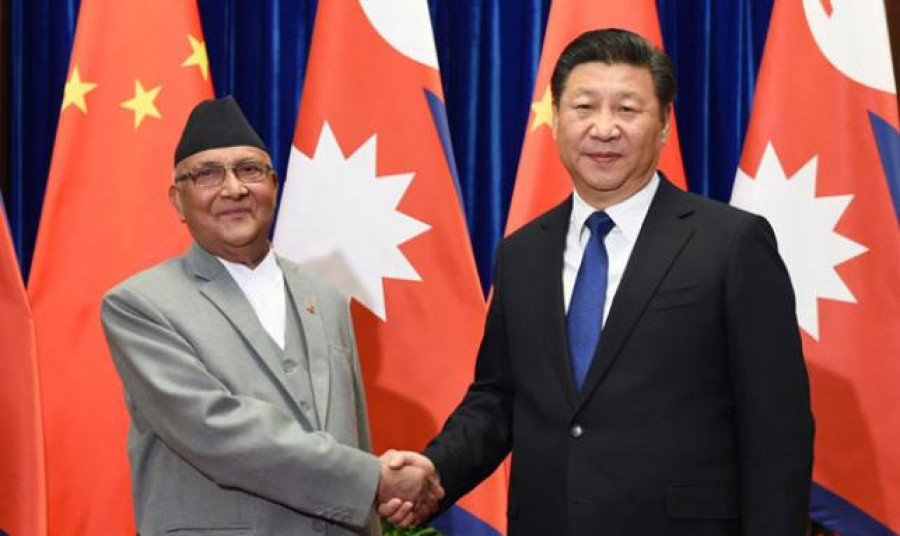Politics
Nepal and China to discuss extradition treaty during Xi Jinping’s visit
An agreement on the treaty, however, is unlikely, officials say.
Binod Ghimire
An extradition treaty with China is a key agenda for discussion during Chinese President Xi Jinping’s upcoming two-day visit to Nepal. Officials, however, said an agreement is unlikely.
The draft of the treaty, finalised by officials from Nepal and China, will be discussed as per the spirit of the statement issued jointly by the two countries during Prime Minister KP Sharma Oli’s China visit in June last year, officials said.
Point 10 of the statement says that the Nepali and Chinese sides agreed to negotiate the Treaty on Mutual Legal Assistance in Criminal Matters and Treaty on Extradition in order to strengthen cooperation on the administration of border areas and combat illegal border crossings and transnational crimes.
Based on the understanding reached in Beijing, taskforces from both sides had worked on the treaty’s draft.
Ram Krishna Subedi, joint-secretary at the Ministry of Home Affairs, led the Nepali taskforce, which also included representatives from the Ministry of Law and Justice. Officials familiar with the matter said that the Nepali side had held several rounds of negotiations with a Chinese team that had come to Nepal for the purpose.
“The treaty is a priority for both the Nepali and Chinese sides,” said an official at the Law Ministry on condition of anonymity as he was not allowed to speak on the matter.
A leader from the ruling Nepal Communist Party (NCP) confirmed that discussions on the treaty are on Xi’s visit agenda.
“There will indeed be a discussion on the matter, but the rumours about an agreement are baseless. Nepal is discussing a similar treaty with India, so discussions will be held with China as well,” Narayan Kaji Shrestha, the ruling party spokesperson, told the Post.
Shrestha said that the Cabinet had not endorsed the treaty yet and that it had only been enlisted for discussion.
During an all-party meeting called by the government on Thursday to discuss Xi’s visit, Minister for Foreign Affairs Pradeep Gyawali said there were no preparations to sign an extradition treaty with China.
Former prime minister Baburam Bhattarai urged the government not to sign the treaty for now as discussions for a similar agreement with India were ongoing.
Nepal signed an extradition treaty with India on October 2, 1953, when Matrika Prasad Koirala was the prime minister. The Indian side, however, has been demanding a revision to the treaty.
In 2006, Nepal and India were close to signing an Extradition Treaty and the Treaty on Mutual Legal Assistance. Negotiations however failed due to disagreements among the parties in Nepal. Similar attempts collapsed in 2008 and 2010. The treaty would allow the two countries to hand over criminals from third countries to each other.
Even in the lack of an agreement, police forces from both Nepal and India have been handing over criminals on an informal basis to each other.
Nepal Police arrested Mohammed Ahmed Sidibapa aka Yasin Bhatkal, co-founder of the Indian Mujahideen, and most-wanted criminal Bablu Dubey in 2013 and handed them over to India. Similarly, Dr Ameet Kumar, who was operating an illegal kidney racket, was handed over to India after an arrest in Nepal.
China forwarded the planned text of the extradition treaty to Nepal for consideration in 2009. After his visit to China in 2014, then home minister Bamdev Gautam had told reporters that Beijing had called for an early signing of the extradition treaty.
A senior government official who did not wish to be named described media reports that Nepal and China are set to sign the extradition treaty as baseless.
“The Home Ministry has forwarded the draft, but no further discussion has taken place,” the official told the Post.
Multiple officials that the Post spoke with said that an extradition treaty with China at this time could boomerang on the government, as a similar treaty with India has been pending for years.
“The signing of the treaty alone is not adequate,” said the senior government official. “It needs to be ratified by a two-thirds majority in Parliament.”
(Anil Giri contributed reporting.)




 17.9°C Kathmandu
17.9°C Kathmandu














